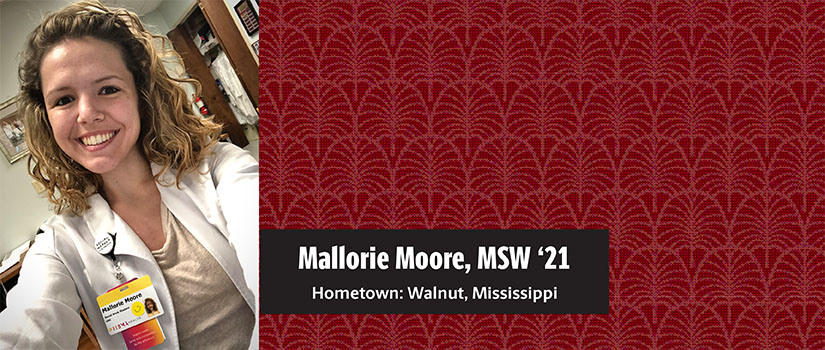I always knew that I wanted to help people, and social work was a career where I could be that someone without having to poke and prod them.
- Mallorie Moore
Childhood experiences can sometimes influence a career choice. Whether positive or negative, these experiences can have a significant impact on someone’s future. Master of Social Work student Mallorie Moore dealt with her share of trauma growing up in Walnut, Mississippi. But her decision to choose social work can be traced back to some of her childhood experiences.
“Most of my motivation for wanting to study social work came from my childhood and not having the best experiences with the child welfare system,” Moore says. “I also wanted to be the person that I would have wanted there for me when I was their age.”
Moore’s mom had a borderline personality disorder, which was marked by patterns of varying moods, self-image and behavior. She alienated Moore from her dad and was made to be fearful of him. She did not have a relationship with her dad from when she was seven years old until a week before her wedding.
“I didn't connect with him until I got away from my mom and started college where I could do things independently and be my own person,” Moore says. “I now see situations where a parent is often not at fault when they are not allowed to see their kids.”
Moore was diagnosed with a trauma disorder catalyzed by this parental alienation and was in a home situation where she was seen but not allowed to be heard. Everything had to filter through her mom, and she was not allowed to make her own decisions.
“I now realize that my mom’s behavior was due to her mental illness and it being a 'I hate you, but don't leave me' sort of disorder,” Moore says. “There were times where she wanted to do something and needed to use me, or say she was with me as an excuse and leave me at a gas station until 2 or 3 in the morning.”
Since Moore had to tell her mom everything while living at home, she felt that she could not see a counselor and be authentic. It was not until she left home and began her undergraduate studies in social work at Mississippi State University that she began seeing a counselor. Even though she admits the entire process of talking with a counselor made things worse before it improved, she was appreciative of everything and now feels much better overall.
“One day I was on the drill field at Mississippi State, and I was at rock bottom with my mental health,” Moore says. “I looked down at my feet under the tree I was leaning against and saw it was the ‘freedom tree.’ That was my ‘Ok God, I hear you’ moment.”
Moore also developed her passion for hospital social work by coincidence at Mississippi State. She was forced to switch field placements about halfway through her studies due to unforeseen circumstances and only had two choices for a new placement: a hospice agency about 30 minutes away or a hospital five minutes from her house. She was fine with working at a hospital and looked forward to wearing scrubs every day.
“I worked in the labor and delivery unit and saw the whole process of working with moms,” Moore says. “That sparked something in me because most times we were consulted it was because of substance abuse. Most of the treatment was punitive instead of rehabilitative. It frustrated me because they were being punished with this new life they brought into the world when they really needed help.”
Moore’s field experiences in a hospital continued after beginning her MSW studies last summer while her husband, Jared, began his master’s studies at the University of South Carolina School of Music. She believes her field placement at Prisma Health has given her more experience on her ability to act on her own values and interests.
“There was one day last semester where my field instructor was out, and I was told that I could do case management for the unit,” Moore says. “It was a 20-person unit, and we had tons of help from the hospital staff. They were great, and told me, ‘You got it,’ once I took the lead.”
And whenever Moore needs to relax or take a mental health break, music has always been her self-care. She participated in marching band in high school and still plays percussion at her church. Music has always brought her joy and lifts her out of mental health slumps.
“When I noticed that my mental health was out of sorts, it was usually because I stopped playing music or singing,” Moore says. “Once I got back into music, I felt it was something that helped me get back to where I needed to be since I was neglecting my mental health.”
Moore has overcome childhood trauma and mental health issues. Given her home situation and the negative misconceptions some people told her about social work, it would be understandable for her to avoid the profession. But she always thought there was more to social work. Moore learned more about the field, found her niche in hospital social work, and is now looking forward to a fulfilling career.
“I really didn’t know that social work was where I was supposed to be until I got more into my field placements and did more direct practice,” Moore says. “Once I started working with clients, and saw the impact that social work can have, including the ability to advocate for policy-level change, that was when I realized that I could truly make a difference.”
